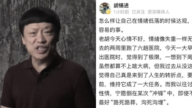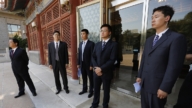【新唐人2012年2月9日讯】大陆浙江年轻女富豪“吴英案”二审被判死刑后,海内外舆论哗然,认为吴英“罪不至死”,呼吁最高法院慎重复核死刑。此案法官最近辩称,判决符合中国的刑法规定。有律师指出:这个刑法是恶法,是当权者以权谋私早已做好的铺垫。
中国法院二审判决吴英死刑之后,中国法律界、企业界、学术界以及普通民众的反对声,一浪高过一浪。
2月7号上午,浙江省高院法官、“吴英案”二审审判长沈晓鸣回应说:“一、二审法院认定吴英构成集资诈骗罪与本案的事实和中国的刑法规定相符,吴英举报官员属于坦白罪行,不属于立功行为。”
上海律师李天天指出,吴英的案子并没有违背法律,也不至于被判到死罪。
李天天:“吴英的案子严格的来说也没违背法律,法律规定那种犯罪可以判到死刑,这个规定本身我就认为是恶法,它违背了法律的刑法的基本宗旨,不是罪大恶极的不应该判处死刑。现在老百姓觉得非常明显,这样的犯罪怎么能判死刑呢?跟很多的大贪官比起来,然后老百姓发现了这个问题,职务犯罪为什么判的那么轻呢,几千万,上亿的基本上没有几个处死刑的。
2007年2月7号,吴英因涉嫌非法集资被刑事拘留,3月16号被正式逮捕。
吴英曾在05至07年间向社会公众集资人民币7.7亿元,因生意亏损,在被捕时3.8亿元债款无法偿还。她在看守所内举报了17名参与此案的中共官员和银行负责人。
英国《金融时报》报导认为,吴英在庭审过程中因交代了一些中共官员参与高利贷活动,以致于10多位官员联名向上级写信要求严惩吴英,这些人才是杀死吴英的“凶手”。
李天天表示:在当权者的权益受威胁时,这个恶法被充份利用了。
李天天:“实际上就是报复,变相报复,但是这个恶法又被它们充分利用了,说透了还是这个制度不好 。这个专制政府它在立法的时候就已经给它们自己的以权谋私做了很多的铺垫 ,以前也没有这种判到死刑的先例,所以这次这么判呢,大家都才注意到这个法是恶法。”
李天天指出,中国的很多犯罪都是被逼的。
李天天:“最主要的是国家的金融秩序管理的不好,是国家管理的失职,你像一些中小企业它贷不到钱,它就要跑私人钱庄去贷,它为了发展,就要到那些地方去贷款,但是你一贷款,这种情况,他就说你犯罪了,扰乱金融罪秩序。”
对于吴英被判死刑,许多法律界人士和民众认为,无论是从犯罪根源、作案动机、法院定罪和量刑来看,吴英都罪不至死。
2月6号,中国一批知名律师和学者聚集在“中国政法大学”,出席“吴英案法律研讨会”。会后学者们发出“刀下留人”的呼声;7号,另一批法律界和企业界名人也出席了由“北京天则经济研究所”主办的相关研讨会,他们同样向政府发出了“慎用死刑、改革金融秩序”的呼吁。
李天天指出,“吴英案”之所以引起大家的关注,一方面是民众从“吴英案”看清了这个恶法,群起反对;另一方面金融垄断太过厉害,民众都站出来为吴英说话,实际也是为民间的的集资说话。
新唐人记者李韵、王明宇采访报导。
Chinese Rally Together Against Death Penalty for Wu Ying
The young rich businesswoman Wu Yin was handed the
death sentence in the 2nd-instance trial in Zhejiang province.
The verdict aroused widespread uproar in China and abroad.
The public views the imposed penalty on Wu Ying as being
too big and are calling on the highest court to restrict application of the death penalty.
Recently, the judge of Wu Ying’s case claimed that
the verdict was in line with China’s criminal law.
Lawyers point out that the existing criminal law is an evil law,
a bedding that the ruler laid earlier for obtaining personal gains.
China’s court issued a second-instance death penalty on
Wu Ying.
The verdict evoked waves of opposition from China’s legal sector,
business circles, academic community and general public.
On 7th Feb, Shen Xiaoming, presiding judge of the 2nd-instance
trial for Wu Ying in the high court of Zhejiang, gave a response.
“The courts of the 1st and 2nd instance held that Wu Ying
committed financial fraud.
The fraud charge is in line with the facts of the case and
the stipulation of China’s criminal law.
Wu Ying’s reporting of implicated officials is deemed a
crime confession, not a meritorious act.", said Shen.
Shanghai-based lawyer Li Tiantian, says Wu Ying did not
violate the law, a death penalty is too heavy handed.
Lawyer Li Tiantian: “Strictly speaking,
Wu Ying’s case didn’t violate the law.
According to China’s law, a crime can receive the death
penalty, I think the provision in itself is an evil law.
Because it goes against the basic purpose of criminal law,
that is, no death penalty can be handed down for non-atrocious crimes.
Now the general public has found a problem with it.
Why are those petty crimes receiving such light sentences?
Few officials faced execution albeit their corruptions are
higher than tens of millions of RMB and even over hundreds of millions."
In February 2007, Wu Ying was placed under
criminal detention on suspicion of illegal fund-raising. Wu was formally arrested in March.
In 2005-2007, Wu Ying raised funds from the public,
totaling amounts of 0.77 billion RMB.
When Wu was arrested, she owed debts of 0.38 billion RMB
due to business losses.
In custody, Wu reported 17 CCP officials and bank leaders
who were involved in the case.
UK’s Financial Times reviewed that those implicated CCP
officials are the “murderers” wanting to kill Wu Ying.
In the trial process, Wu confessed that some CCP officials
participated in loan sharking.
Afterwards a joint letter from over 10 CCP officials ensued,
they wrote to their superiors and requested a harsh punishment for Wu Ying.
Li Tiantian says that the evil law was fully utilized when
the interests of those in power were threatened.
Lawyer Li Tiantian: “It’s in fact revenge, in a disguised form.
While this evil law was fully utilized by them.
In short, the problem lies in the system, a bad system.
This autocratic regime has paved ways for their personal gains
when they enacted laws.
No precedent death verdict was handed down to such cases in
the past, but this time they did.
So the verdict enables us all to note that
the law is an evil law."
Li Tiantian reveals that in today’s China, lots of crimes are
forced to be committed.
Lawyer Li Tiantian: “The main reason is China’s poor
management of financial order,
this is a dereliction of duty, in terms of state administration.
For example, when some small and middle-sized enterprises
cannot get bank loans, they have to rely on underground banks.
But when they get loans from these private banks, they are
accused of committing crimes – Disturbing Financial Order."
The CCP’s death penalty on Wu Ying was deemed heavy handed,
many legal professionals and the public commented.
They reviewed the case from the perspective of the crime
committed, the motive, the court’s conviction and imposing penalty.
On 6th Feb., a number of renowned lawyers and scholars
attended a legal seminar on Wu Ying’s case in Beijing.
After the seminar, they cried out “Keep Wu Ying alive”.
On Feb.7, another group of legal and business celebrities joined
a seminar hosted by Uni-rule Institute of Economics in Beijing.
These elite people voiced a similar appeal to the regime—
“Be cautious in using the death sentence, make reform of the financial order."
Lawyer Li Tiantian reasons why Wu Ying’s case became
a focus of public attention.
On one hand, the case helps the public be well aware of
the evil law, thus people all stand up to oppose it.
On the other hand, China’s financial monopoly is
so severe that people volunteered to back up Wu Ying.
They actually are standing up and speaking out for
fund-raising in the private sector, Li thinks.
NTD reporters Li Yun and Wang Mingyu



























